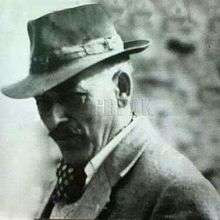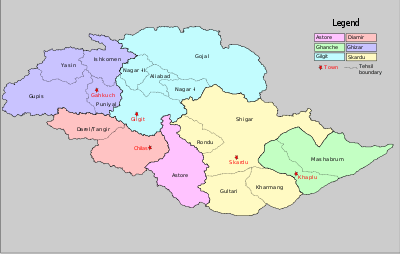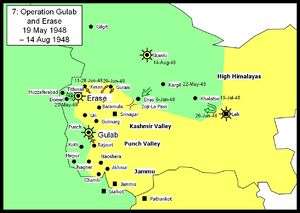Mirza Hassan Khan
| Mirza Hassan Khan | |
|---|---|
 | |
| Native name | مرزا حسن خان |
| Born |
27 January 1919[1] State of Nagar |
| Died |
19 November 1983 (aged 64) Gilgit, Northern Areas (now Gilgit-Baltistan) |
| Resting place | Chinar Bagh, Gilgit |
| Alma mater |
Sri Pratap College Indian Military Academy |
| Organisation | Gilgit Scouts |
Mirza Hassan Khan (Urdu: مرزا حسن خان) was a Captain of the 6th Infantry of the Jammu and Kashmir State Forces based at Bunji in the Gilgit wazarat (now Astore district). In October 1947, Khan was sent with troops to assist the Dogra governor Ghansara Singh in Gilgit, who was apprehensive of the loyalties of the Gilgit Scouts based in Gilgit. Mirza Hassan Khan sided with Major William Brown of the Gilgit Scouts in overthrowing the governor.[2]
On 2 November 1947, Mirza Hassan Khan and other officers of the rebel forces, announced a provisional government, with Raja Shah Rais Khan as the President and Mirza Hassan Khan as the Commander-in-Chief. William Brown was told that, being a non-Muslim, he could not hold any post in the government. In his autobiography, Khan ascribed to himself a central role in the coup. Scholar Yaqub Ali Bangash doubts his account.[3]

William Brown had already telegraphed the Pakistan government in the North-West Frontier Province informing them of the coup and asking them to take over the administration. Pakistan's Political Agent, Khan Mohammad Alam Khan, arrived on 16 November and dismissed the provisional government. Thus the Gilgit Agency was absorbed into Pakistan. Mirza Hassan Khan was appointed the military governor for the Bunji sector and asked to focus on that area only.[4]
Indo–Pakistani war

On 19 January 1948, Pakistan appointed Major Mohammad Aslam replacing William Brown as the commander of Gilgit Scouts.[5] Major Aslam organised all the forces in Gilgit into three wings of 400 men each, which were called the Ibex Force, Tiger Force and Eskimo Force. The three forces were ordered to advance along three directions into the state of Jammu Kashmir. Mirza Hassan Khan was put in charge of the Tiger Force, which advanced on the Gilgit-Bunji-Kamri-Gurais-Bandipora axis. The force reached Bandipora on 28 April, but had to withdraw to Tragbal. When Gurais was recaptured in June by the Indian forces, the Tiger Force withdrew to Minimarg.[6][7]
Awards
According to a report on Radio Pakistan, Khan was awarded a Military Cross for bravery by the British Indian Army in 1943, when he fought in Burma as part of the Jammu and Kashmir troops in the Second World War. He was awarded the title of Fakhr-e-Kashmir by the Azad Kashmir government and Tamgha-i-Jurat by the Pakistani government.[1] He was also given the title of Fateh-e-Gilgit wa Baltistan locally (Liberator of Gilgit-Baltistan).
References
- 1 2 "Death anniversary of Col Mirza Hassan Khan being observed today", Radio Pakistan, 19 November 2014
- ↑ Bangash, Three Forgotten Accessions 2010.
- ↑ Bangash, Three Forgotten Accessions 2010, p. 132.
- ↑ Bangash, Three Forgotten Accessions 2010, p. 133.
- ↑ Bangash, Three Forgotten Accessions 2010, p. 134.
- ↑ Cheema, Brig Amar (2015), The Crimson Chinar: The Kashmir Conflict: A Politico Military Perspective, Lancer Publishers, p. 85, ISBN 978-81-7062-301-4
- ↑ Khanna, K. K. (2015), Art of Generalship, Vij Books India Pvt Ltd, p. 158, ISBN 978-93-82652-93-9
Bibliography
- Bangash, Yaqoob Khan (2010), "Three Forgotten Accessions: Gilgit, Hunza and Nagar", The Journal of Imperial and Commonwealth History, 38 (1): 117–143, doi:10.1080/03086530903538269, (subscription required (help))
Further reading
- Khan, Mirza Hassan, Shamsheer Se Zanjeer Tak (Autobiography), Islamabad: Maktab Press
- Tareekh-e-Baltistan By Yousuf Hussain Abadi
- Gilgit ke Azadi, Urdu Digest, 1990
External links
- "Hero of liberation war of Gilgit-Baltistan‚ Col Hassan Khan Jarral Sahib". GB247 web site. Archived from the original on 22 December 2013.
- Syed Shamsuddin, Gilgit-Baltistan – A Historical Narrative (blog post), Window to Gilgit-Baltistan, 25 August 2015.